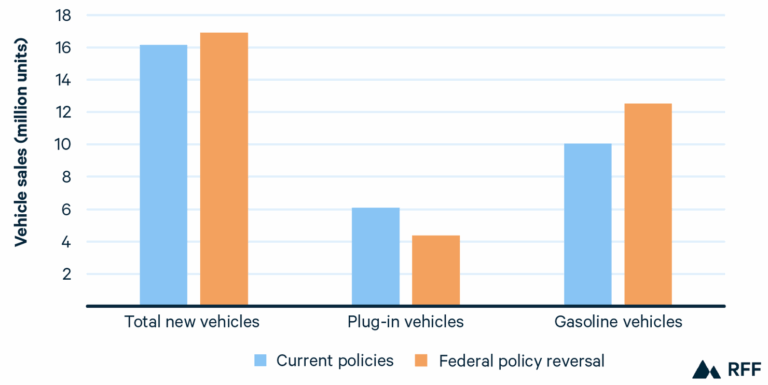The Potential Consequences of Reversing Electric Vehicle Policies
A recent analysis from Resources for the Future reveals that upcoming electric vehicle (EV) policy reversals in the United States could impose a substantial $33 billion cost on society overall by 2030. The US Congress and the Trump administration are considering revoking Biden-era EV policies, including eliminating subsidies for purchasing EVs and producing batteries domestically.
Current Policy Context
Vehicle electrification has been supported by various policies aimed at reducing the cost of manufacturing and buying EVs. The Inflation Reduction Act has provided subsidies for new and used vehicle purchases and advanced manufacturing tax credits to lower battery production costs. Two major regulatory standards have also incentivized EV production:
- Federal greenhouse gas emissions standards and Corporate Average Fuel Economy standards adopted in 2024 for vehicle models sold after 2026
- The Clean Air Act waiver allowing California to set its own emissions standards, which other states have followed
Proposed Policy Changes
Recent efforts are dramatically changing these policies. The House budget proposal released in May would repeal vehicle purchase subsidies and effectively eliminate battery subsidies. The National Highway Traffic Safety Administration and the Environmental Protection Agency have indicated they will reverse fuel economy and greenhouse gas standards. Additionally, the House and Senate have voted to revoke California’s Clean Air Act waiver through the Congressional Review Act.
Projected Impacts of Policy Reversal
Using the Vehicle Market Model created by Resources for the Future, simulations compare two scenarios for 2030:
- The current policy framework
- EV policy reversal, including removing subsidies, freezing greenhouse gas standards at 2026 levels, and eliminating the Advanced Clean Cars program
The analysis reveals that the EV policy reversal would:
- Increase total new vehicle sales by about 800,000 units (5%)
- Decrease EV sales by 1.7 million units (30%)
- Increase gasoline vehicle sales by 2.5 million units (25%)
- Reduce vehicle prices by about 10%
Societal and Economic Impacts
While manufacturer profits would increase by $15 billion due to reduced regulatory requirements, consumers would face significant losses. The policy reversal would:
- Decrease consumer well-being by $27 billion due to higher fuel costs outweighing lower vehicle prices
- Increase environmental costs by $50 billion through higher greenhouse gas emissions and worsened air quality
- Generate $30 billion in federal budget savings by eliminating EV subsidies
Conclusion
The overall effect of reversing EV policies would be a $33 billion cost to societal well-being. While manufacturers and the federal budget might benefit, these gains would be far outweighed by the costs to consumers and the environment. The analysis suggests that maintaining current EV support policies would be more beneficial for society as a whole.





